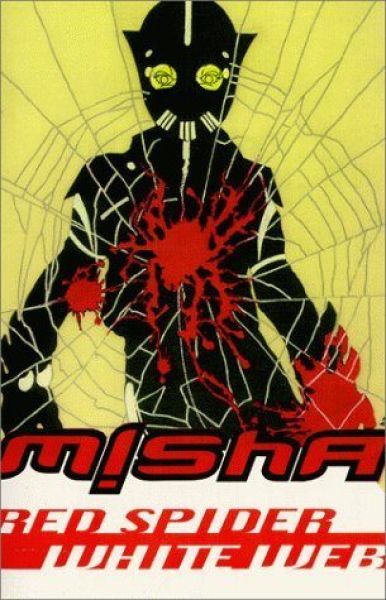Down Came the Rain
Red Spider White Web
By Misha

27 Oct, 2022
Misha’s 1990 Red Spider White Web is a stand-alone cyberpunk novel.
Mickey-San provides its pampered inhabitants with every luxury that they could desire: a sealed environment, desperate employees to tend to their every need, even immersive virtual reality so that they need never sully their eyeballs by gazing on the real world. For the lucky few who can call Mickey-San home, it is as close to paradise as possible at this time.
Kumo does not live in Mickey-San. She lives outside, in the slums. Her life is quite different from that of a denizen of Mickey-San.
The desperate poor out in Ded Tek are free to enjoy the toxic stew that the atmosphere has become, unless they can afford masks. They are free to be preyed upon by Mickey-San’s bored, vicious youths, unless they can somehow elude them or fight back. They are free to be arrested or gunned down by the police on the slenderest of pretexts, unless they can avoid catching the eye of the roaming patrols.
Artist Kumo’s life is filled with abject poverty, casual violence, ambushes, and poverty. Those who see her as easy prey discover that survival has honed Kumo’s fighting skills, which are entirely uninhibited by any sense of fair play. Nevertheless, circumstances can overwhelm even the prepared. Kumo is well aware that someone is hunting Ded Tek’s artists, transforming their corpses into works of art.
While all too interesting (read stressful) from the perspective of the slum dwellers, the system has advantages. Bored kids have something to do. Ded Tekkers are highly motivated to find jobs within Mickey-San and to do whatever it takes to remain employed. While Kumo rejects utterly sacrificing her values for a cushy life in Mickey-San, acquaintances like Motler are more than eager to sell out.
Independence is ultimately a death sentence. Selling out is merely a stay of execution until one is discarded. Doom is certain. The only question is what form it will take.
~oOo~
I am a bit worried that the description above may give the impression of a book more upbeat than Red Spider White Web actually is. This isn’t a jolly romp like a Disch, Watts, or Geston novel, but something more downbeat than that.
One could make an educated guess as to when this was written. It features a world dominated by an unstoppable Japanese juggernaut1. Remember the unstoppable Japanese juggernaut? Rather like the fall of the Soviet Union, the misfortunes that beset the Japanese economy came as a complete surprise. Thank goodness we no longer get blindsided like that.
On the other hand, large swaths of the setting aren’t dated at all. For example, the rich live in a (seemingly safe) bubble, within which they embrace Metaverse-style illusions. The poor majority are left to deal with a hardscrabble life as best they can or die (often “and die”). One is reminded of the wealthy in The Great Gatsby:
They were careless people, Tom and Daisy — they smashed up things and creatures and then retreated back into their money or their vast carelessness, or whatever it was that kept them together, and let other people clean up the mess they had made.
Except that in this case the mess is too big to be cleaned up, and rather than being narrated by the comfortably rich-adjacent, the perspective is very firmly a gutter-eye view.
The author is Metis-Cree. How post-racial is her setting? Well, the title is a hint. There is a race-based pecking order and Native Americans are so far down it that some characters seem convinced they don’t exist at all. Not to say that Native American elements were not sometimes incorporated into other cyberpunk works — usually as a narrative flourish rather than something with which the author had personal experience.
Cyberpunk is notorious for being a blokey genre; when women appear (as they do from time to time) they appear as they must be to cater to the male gaze. Sure, they may be deadly assassins enhanced to the point that their humanity is open to question, but they are almost always extremely sexy deadly assassins (enhanced to the point that the verisimilitude of their breasts and buttocks is open to question). Red Spider is decidedly short on perfectly buffed razor-girls and long on body fluids and odors. When published, Red Spider seems to have been considered an iconic example of feminist cyberpunk. It’s just too bad the publisher couldn’t have found at least one woman critic to author one of the three commentaries appended to this volume.
Not only did I not find Red Spider White Web for sale at Amazon, Barnes & Noble, Book Depository, or Chapters, I did not find it at AbeBooks, Ebay, or Bookfinder (save as part of a fantastically expensive set).
1: Japan has goals entirely incomprehensible to the Americans, who cannot perceive reasons to act if they do not involve money, so it is just too bad for the cosseted wealthy they do not, cannot, understand the game in which they are involved.
